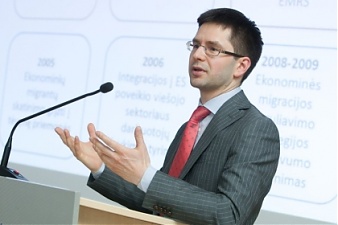Analytics, Direct Speech, EU – Baltic States, Labour-market, Lithuania, Markets and Companies
International Internet Magazine. Baltic States news & analytics
Saturday, 14.02.2026, 08:46
Migration and the Lithuanian economy
 Print version
Print version |
|---|
They settled in the UK, Ireland,
Germany, Norway, and many other countries. Lithuanian citizens may be found
working in all sectors of the host countries’ economies, from low-skilled jobs
in agriculture and the service sector, to technical, academic or managerial
positions requiring highly sophisticated skills. From the personal perspective
of most migrants, mobility has worked well: they have not only gained income
and learned new skills, but also contributed to the economies of the host (by
paying taxes) and home country (by sending remittances). Nonetheless, behind
every migration experience there is a story of success and disappointment,
excitement and nostalgia, friendship and loneliness. These mobile workers have
also undergone a process of redefining their links to the home and host
countries, and, in broader terms, reinterpreting their identities, including
the crucial question of whether they are settling abroad permanently, or one
day plan to return. During the same period, Lithuanian society has undergone a
lengthy process of defining its own relationship to the mobile part of the
population.
The narratives vary, from
celebration to despair. Migration has produced varied and complex effects, some
of which are still unfolding. It has not only decreased the labour supply, but
also the number of students and schoolchildren, due to the emigration of entire
families, or family reunions in host countries. It has had a negative effect on
the quantity and quality of public services, with many doctors and teachers
opting for a career abroad. The country’s demographic balance has been
affected, as the migrant population predominantly consists of those aged 25 to
45. On the positive side, the majority of mobile Lithuanians maintain links to
the country and do not define themselves as ‘emigrants’. Some of them
contribute to the home country’s economy through their networks, business or
charitable initiatives. A significant number of migrants have returned to the
country, and brought with them not only their savings, but also the skills and
connections they developed abroad. The migrants have attracted foreign direct
investment into Lithuania, particularly by facilitating business connections;
there are also examples of persons returning to Lithuania to establish branches
of the companies in which they have pursued successful careers.
Egidijus Barcevičius Research Director PPMI Research & Advice Associate Professor
Vilnius University Lithuania Academics and practitioners are engaged in a
protracted discussion as to the best policies to address migration and
encourage return. In essence, this discussion is about the ability of the
government to direct the economy of the state, and to influence the complex
decisions made by its people. Some authors take a statecentrist view and
believe that a mix of political will, appropriate policies and adequate
resources could change the dynamics of the current situation. Yet the process
of migration has a great deal of inertia at a time when public resources are
scarce, and demands upon them from all groups in society appear
ever-increasing. Policy success depends not only on the ability of the
political leadership to identify the correct policy principles and say the
right words, but also to gain trust, inspire and agree on compromises. It is
also contingent on the administrative capacity of state institutions to
actually work out the policy details and implement them. An appropriate policy
mix would recognise migration as an important personal decision and acknowledge
its benefits. All of these would be supported by policies aimed at maintaining
links with the mobile part of the population, involving it in the political process
of the home country, and cultivating cultural exchanges. In the long term the
key is to tackle the economic and social factors involved in migration, which
are also intrinsically linked to the overall economic and social success of the
country. This means focusing on key drivers such as education and innovation,
and at the same time finding the right balance between flexibility and security
in the labour market. Indeed, various existing policies in different fields
inadvertently encourage or discourage return migration and integration. They
have to be rethought to take into consideration the needs of the mobile
population.








 «The Baltic Course» Is Sold and Stays in Business!
«The Baltic Course» Is Sold and Stays in Business!

